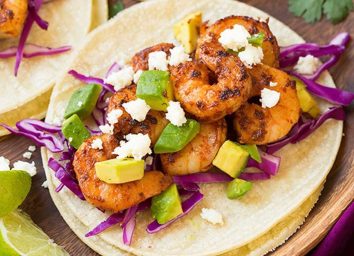The 50 Best Ways to Boost Your Metabolism, Says Science

Metabolism. It's the set of life-sustaining chemical transformations within the cells of living organisms. It's such a big concept that it's understandable to feel as if it's beyond your control. But that's not true!
If you're wondering how to increase metabolism, we've rounded up the 50 best quick and easy ways to rev your fat-burning furnace to help you reach your weight loss goals that much faster. And to keep you on track, be sure you're stocked up on The 7 Healthiest Foods to Eat Right Now.
Eat enough

If you want to weigh less, you've got to eat less, right? Well, if you're not eating enough calories, it can cause your body to lose muscle mass, which will decrease the rate of your metabolism. Plus, when you skimp on calories, your body slows the rate at which it burns calories to conserve the fuel it's got.
"Under-fueling is just as risky as over-fueling," explains Carolyn Brown, MS, RD at Foodtrainers in Manhattan. Lisa Moskovitz, RD, CDN, of the New York Nutrition Group agrees: "In an attempt for quick, noticeable weight loss, many people wrongfully believe that eating as few calories as possible is the best solution. Not only can this lead to numerous nutritional deficiencies as the body is getting less food overall, but it can also actually have the opposite effect on weight loss." Instead of cutting calories like crazy, use the simple diet and exercise hacks below that can help you slim down quickly and safely without screwing up your metabolism.
Put on muscle

Even when you're at rest, your body is constantly burning calories. In fact, 60 to 80 percent of the calories that you burn each day are being used up just keeping you alive, according to research published in Frontiers in Physiology. Studies show "resting metabolic rate" and total calories burned is much higher in people with more muscle because every pound of muscle uses about 6 calories a day just to sustain itself. If you can pack on just five pounds of muscle and sustain it, you'll burn the caloric equivalent of three pounds of fat over the course of a year.
Try HIIT workouts to build muscle mass

When it comes to the best workouts for weight loss, neither weights nor cardio can completely move the needle on their own. Interval training is the best way to shed pounds, increase your metabolism, and improve insulin sensitivity. One International Journal of Obesity study found that 20-minute HIIT workouts helped women lose 5.5 more pounds and gain more lean muscle mass over the course of 15 weeks than women who did long, steady cardio workouts.
At the gym, sign up for a HIIT class, or turn your favorite aerobic exercise, (running, biking, even walking) into an interval workout by adding periods of intense speed (start with 30 to 60 seconds) followed by periods of rest (normal speed) for the same amount of time. Do this six to 10 times to complete a fat-slashing workout. As you get better, slowly increase the amount of time of increased intensity.
Eat enough protein daily
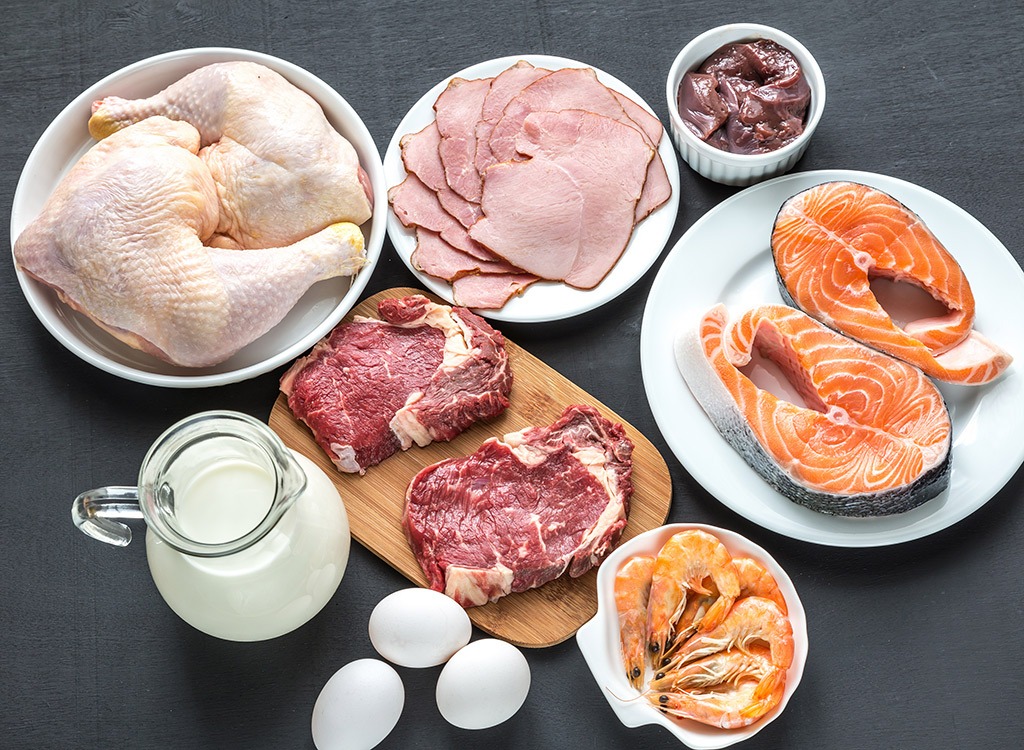
The more muscle you have, the more calories you burn—no matter what you're doing. Hitting the gym helps you build muscle and eating protein keeps your gains from breaking down and slowing your metabolic rate as a result.
Research has found that because protein is more difficult for the body to break down and digest than other nutrients, it can increase post-meal calorie burn by 5 percent. Aim to incorporate some protein into every meal and snack throughout the day.
Metabolism-boosting foods high in protein include:
- Hard-boiled eggs
- Chicken breast
- Ground turkey
- Beans
- Flank, hanger, or skirt steak
Protein needs differ by individual, but typically consuming 0.8 to one gram of protein per kilogram of body weight per day should be sufficient enough to fuel weight loss, says Leah Kaufman, MS, RD, CDN, a New York City-based dietitian. For a 130-pound (59 kilograms) person, that would equal between 46 and 58 grams of protein.
Choose whole grains
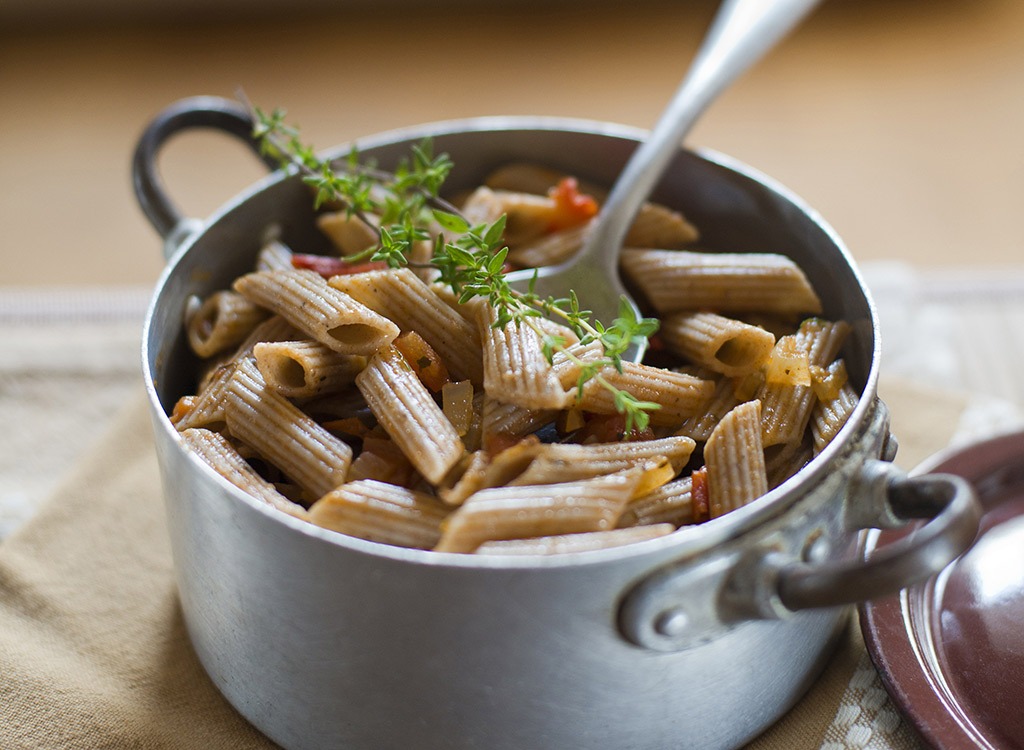
It takes the body extra effort to break down whole grains than more refined and processed grains, like the flour ordinarily used to make bread and pasta. You can help keep your metabolic rate elevated by consuming foods that the body has to work harder to digest, as shown in a Food & Nutrition Research study. Pomona College researchers found that consuming whole foods increased your post-meal energy expenditure by 50 percent compared to eating processed foods.
Your go-to foods that boost metabolism are whole grains that are also rich in fiber.
- Brown rice
- Oatmeal
- Quinoa
- Sprouted grain bread
Get a good night's sleep

Jimmy Fallon's doing great, but now it's time to DVR him and start getting to bed earlier. A study in Finland looked at sets of identical twins and discovered that in each set of siblings, the twin who slept less had more visceral fat. If you do nothing else differently, just getting an extra half hour of shuteye will make all the difference. If you're chronically sleep deprived, don't be surprised if you gain a few pounds without eating a morsel of extra food. "A lack of sleep can cause several metabolic problems," says nutritionist and Holistic Health Coach Seth Santoro. "It can cause you to burn fewer calories, lack appetite control and experience an increase in cortisol levels, which stores fat."
Lack of sufficient sleep—under the recommended seven to nine hours a night for most adults—also leads to impaired glucose tolerance, a.k.a. your body's ability to utilize sugar for fuel. "We all have those less-than-adequate nights of sleep," says nutritionist Lisa Jubilee, MS, CDN. "But if it's a regular thing, you're better off lengthening your night's sleep than working out, if fat loss or weight maintenance is your goal."
And stop napping

Research has found that people burn fewer calories when they sleep during the day and log their waking hours after the sun's gone down. To come to this finding, researchers at the University of Colorado at Boulder studied 14 healthy adults for six days. For two days, study participants slept at night and stayed awake during the day, then they reversed their routines to mimic the schedules of night owls. When participants slept during the day, researchers found that they burned 52 to 59 fewer calories than they did while catching their Zzzs in the evening—likely because the schedule messed with their circadian rhythm, the body's internal clock that plays a major role in metabolism function. If you have no choice but to sleep during the day, aim to cut 50-60 calories from your daily diet.
Eat more high-fiber beans
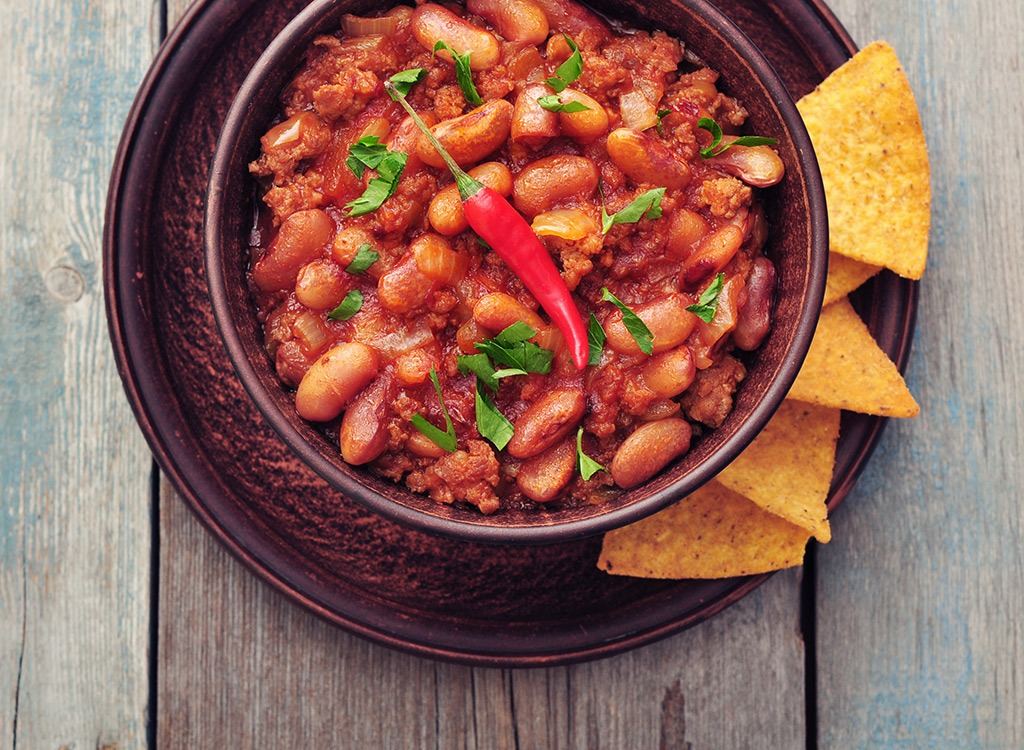
Not only are beans a great source of plant-based protein, they're also packed with both soluble and insoluble fiber. The process of digesting the fiber and protein in beans burns extra calories, and both types of fiber help lower insulin levels after digestion and cause your body to store less fat. Think of every bean as a little metabolism-boosting pill. One study found that people who ate a ¾ cup of beans daily weighed 6.6 pounds less than those who didn't—despite bean eaters consuming, on average, 199 calories more per day.
Reduce common stressors

Stress can actually cause the body to metabolize food more slowly, according to research published in the journal Biological Psychiatry. To make matters worse, the food we crave when we're stressed out tends to be fatty and full of sugar. Researchers say that the combination of high-cal cravings and a stress-induced, snail-paced metabolic rate can result in significant weight gain. To increase your metabolism, fight stress with laughter. Research shows that smiling and laughing causes levels of stress hormones to diminish.
Make sure you're getting enough vitamin D
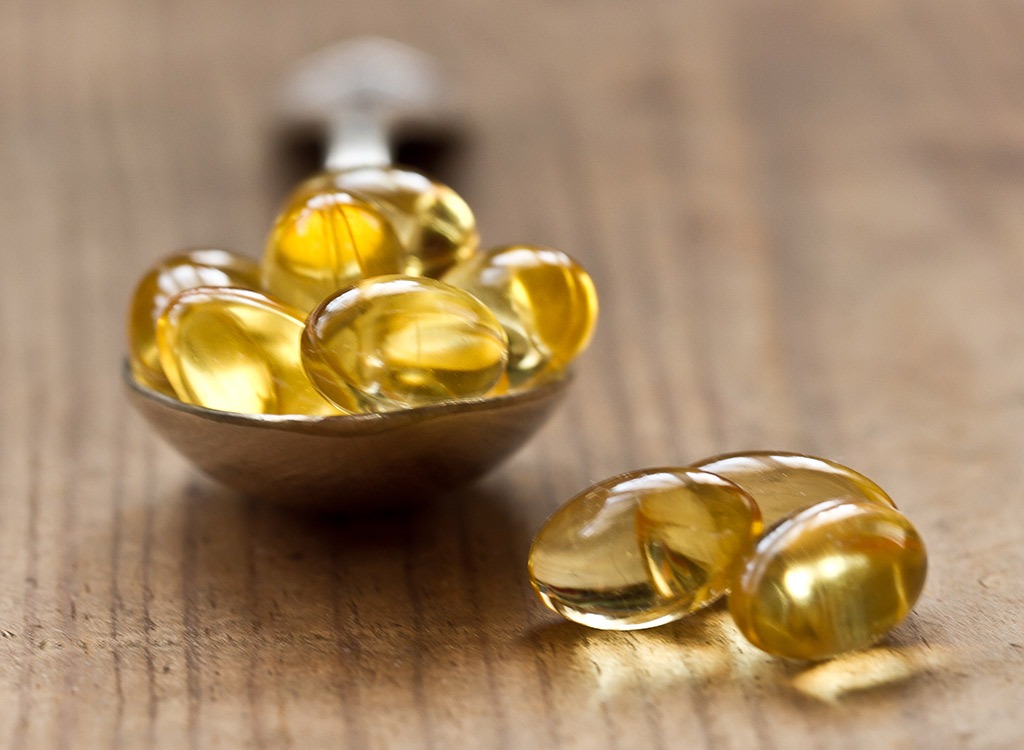
If there's one supplement most Americans should be taking, it's vitamin D. It's essential for preserving metabolism-revving muscle tissue, but researchers estimate that a measly 20 percent of Americans take in enough via their diet. While you can nail 90 percent of your recommended daily value (400 IU) in a 3.5-ounce serving of salmon, popping a daily supplement is pretty convenient.
Good dietary sources of vitamin D for metabolism:
- Tuna: 68 IUs per 3 ounces White Albacore tuna (11% DV)
- Fortified low-fat milk: 120 IUs per cup (20% DV)
- Eggs: 40 IUs per fried egg (7% DV)
Drink a glass of water in the morning when you wake up

For nutritionist Lisa Jubilee, one of the best and cheapest ways to give your metabolism a jolt is to drink water (she suggests 20 to 32 ounces) shortly after waking. Why? During sleep, your body's metabolic function slows down, and unless you wake up in the middle of the night to swig some water, you're not taking in any fluids. Jubilee suggests completely rehydrating before stressing your body with any other food or drink. "My clients who have implemented this report less bloating, more energy and a smaller appetite," she says. Her motto for getting your inner furnace stoked and ready for the day: "Rehydrate, then caffeinate!"
And drink more water in general

Weight loss doesn't get easier than this: Simply drinking more water may increase the rate at which healthy people burn calories, according to a study in The Journal of Clinical Endocrinology and Metabolism. After drinking approximately 17 ounces of water (about 2 tall glasses), participants' metabolic rates increased by 30 percent. The researchers estimate that increasing water intake by 1.5 liters a day (about 6 cups) would burn an extra 17,400 calories over the course of the year—a weight loss of approximately five pounds!
Pack snacks on the go
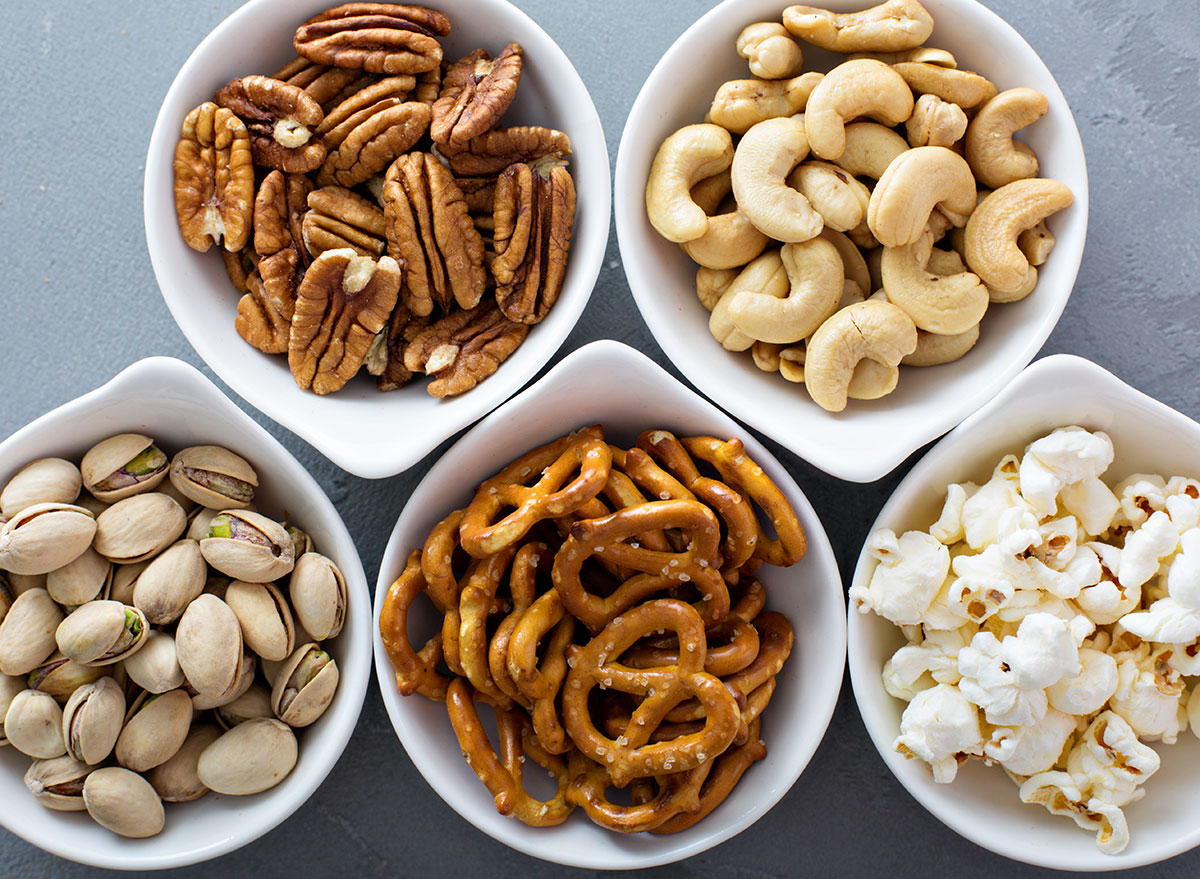
"Always be prepared for a busy or unpredictable day by keeping healthy snacks on you, at your desk, in your car," says Amy Shapiro, MS, RD, CDN, and member of our medical board. Shapiro says that if you have to skip breakfast, lunch, or even dinner during your quest to look your best, you can keep your energy levels up while making healthy choices. "You'll have no reason to run to the vending machine for chips or stick your hand in the candy bowl," she says.
Shapiro recommends eating snacks to keep your metabolism humming such as:
- Almonds or other unsalted nuts
- Apples
- Bananas
- Chia bars
- Protein bars
- Fruit and nut bars
Cut back on diet soda and artificial sweeteners
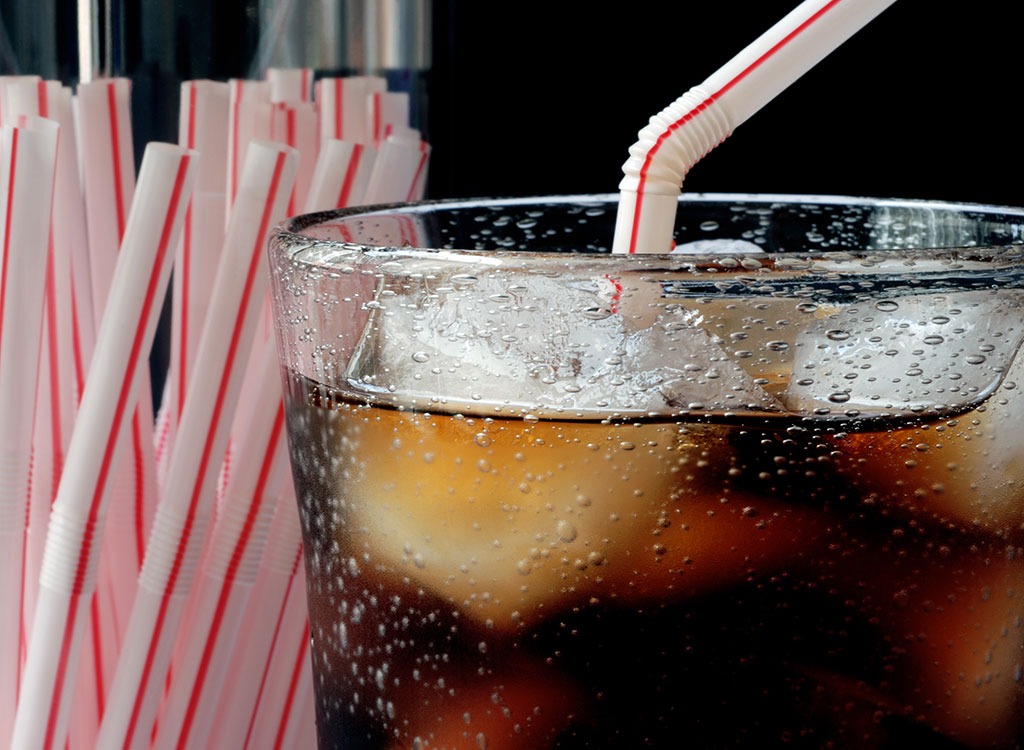
Yeah, yeah, it has zero calories, but drinking diet soda may yet play havoc with your goal of having a flat belly. Research published in the journal Trends in Endocrinology & Metabolism shows that artificially sweetened beverages may screw up the body's normal metabolic response to sugar, actually increasing appetite! Increasingly, diet drinks are being linked to weight gain, metabolic syndrome and a host of other ills. (Find out what happens to your body when you give up soda.)
Go nuts

A 2003 study in the International Journal of Obesity demonstrated that a low-calorie diet that's rich in almonds could help people shed weight. Not only do the good monounsaturated fats in almonds have an effect on insulin levels, say scientists, but also give dieters a feeling of fullness, meaning that they are less likely to overeat. So stock your pantry with almonds, walnuts, and nut butter.
Eat whole foods
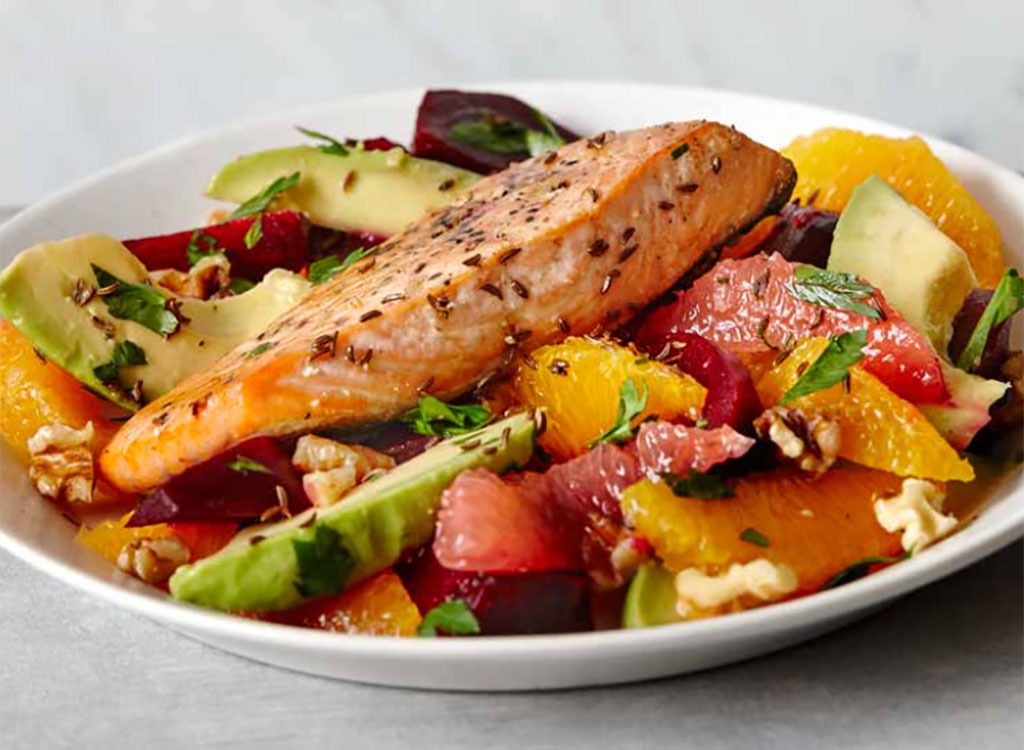
The smoothie revolution is here, and lots of people are swilling down bushels of leafy greens. Believe it or not, there's a downside to this ingenious delivery method. A big part of the body's job—breaking down food so that the body can absorb nutrients—has been outsourced to our Nutribullets and Vitamixes. That means that the body is expending much less energy than it would if we were eating kale, spinach, and bananas in their solid form. Smoothies are great for weight loss, but by prioritizing lean meats, fish, fibrous vegetables and fruit, you are driving up TEF (the "Thermic Effect of Food," or your metabolic rate after eating) and expending more calories on digestion.
Eat salmon
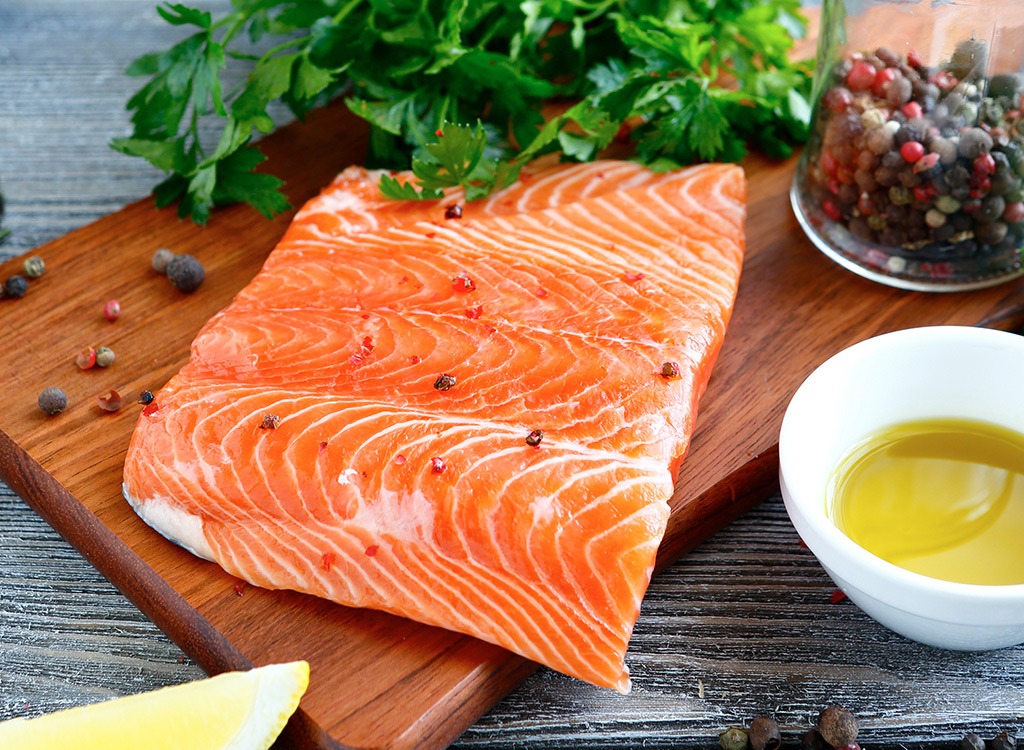
There are plenty of fish in the sea, but salmon may be the best one when you're trying to find out how to increase metabolism. That's because most cases of underactive thyroid are due to inflammation of the gland, and salmon boasts significant anti-inflammatory properties thanks to its rich omega-3 fatty acid content. In fact, a study in the European Journal of Clinical Nutrition looked at the effects of weight loss and seafood consumption and showed salmon to be the most effective at reducing inflammation—better than cod, fish oil, and a fish-free diet.
Eat iron-rich foods
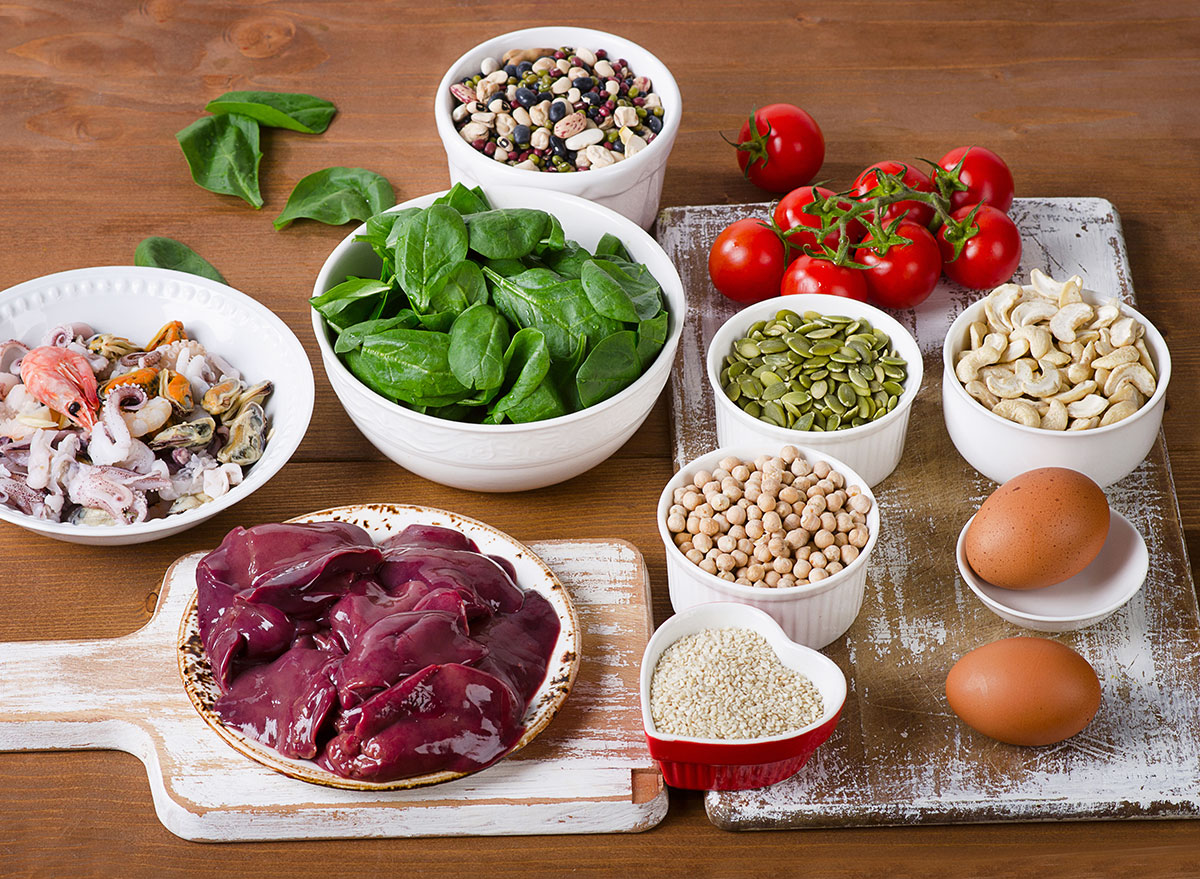
Iron deficiency affects more than 1 in 5 women in the U.S. Being deficient in essential minerals can show up in all kinds of ways, such as fatigue and anemia, but an iron deficiency can also be a blow for your metabolic health. See, your body can't work as efficiently to burn calories when it doesn't have what it needs to work properly. On the other hand, when you treat iron deficiency with sufficient iron intake, you can lose weight and improve metabolic parameters such as lowering blood pressure and bad cholesterol levels, according to a Clinical Therapeutics study.
Iron-rich foods you can add to your diet to boost metabolism include:
- 1 cup iron-fortified breakfast cereal, 100% DV iron
- 1 cup of lentils, 36% DV iron
- 3.5 ounces ground beef, 15% DV iron
- 1 cup spinach, 24% DV iron
Eat three meals a day
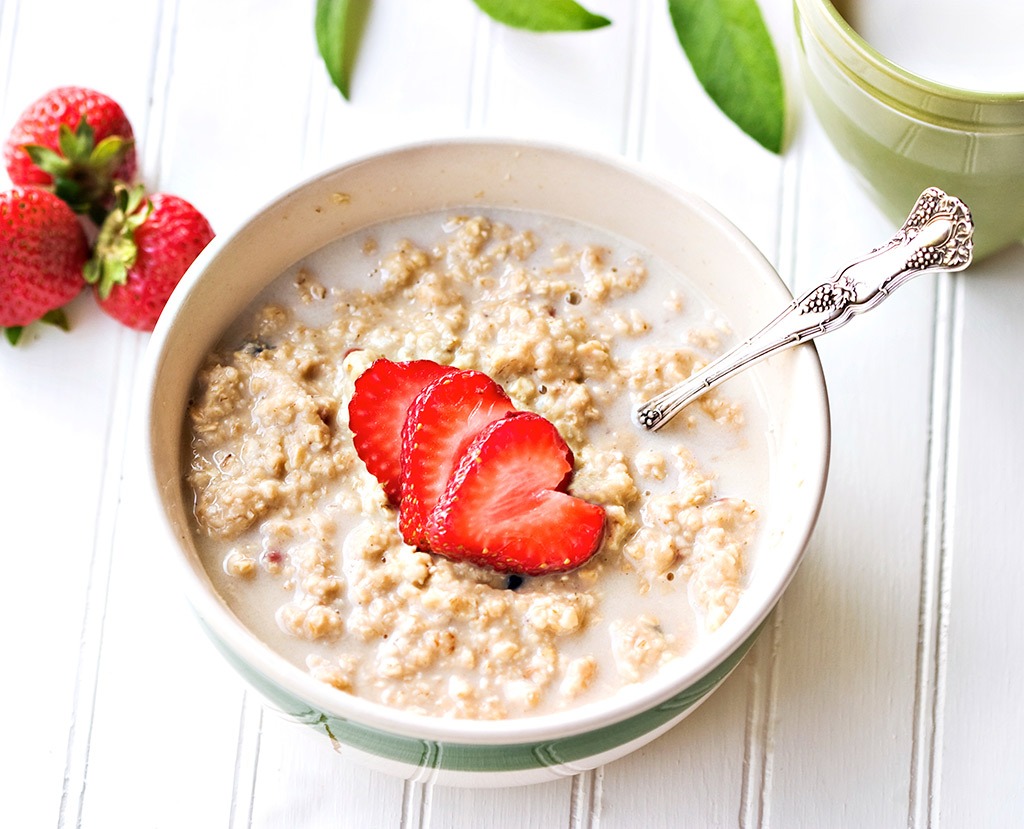
Bodybuilders have long sworn by eating every few hours to keep their muscles fueled, but don't discount the weight loss potential of three squares a day. A study in the journal Hepatology put two groups of men on weight-gain diets. One group divided the calories among three small meals with snacks in between while the second group ate the same number of calories in three square meals. While both groups gained weight, researchers found that belly fat—the dangerous kind that increases heart-disease risk—only increased in the high-meal frequency group.
Drink less alcohol to increase fat burn

While drinking in moderation every so often won't do too much harm to your waistline, making it a habit can slow down your metabolic rate. Why? When your body has a cocktail to break down, it takes precedence over any food that you've already eaten that's waiting to be digested. This slows down the entire metabolic process. On the occasions that you decided to indulge, stick to low-calorie drinks. Alternate your alcohol with water to slow your pace, and cut yourself off after two drinks. Avoid ordering high-cal bar food like fries and burgers. An important note: Wine in moderation can have numerous benefits, including weight loss!
Eat zinc-rich oysters
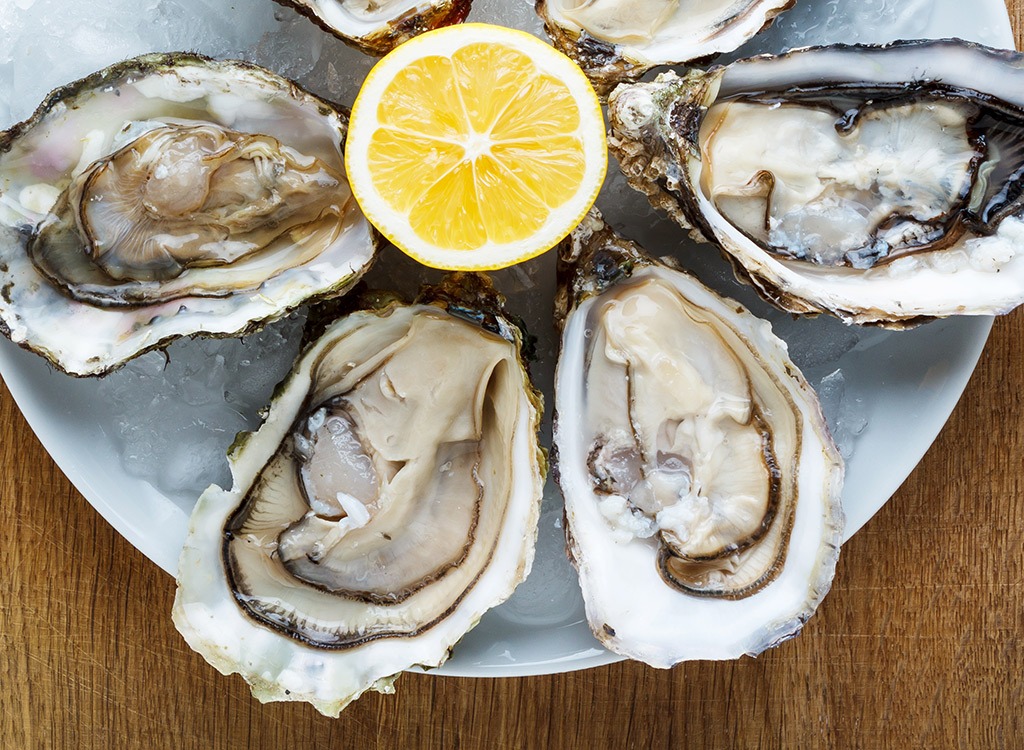
Shuck one for your metabolism. Heck, make it a half dozen. After all, oysters are one of the best dietary sources zinc—a mineral that's critical for thyroid health. In fact, the body needs enough zinc to activate production of thyroid hormone. And, in turn, we need enough thyroid hormone to absorb zinc. Any way you look at it, deficiencies are likely to result in a sluggish metabolism, and supplementing with the mineral has shown to get weight loss back on track. One study in Nutrition Research and Practice found that obese people who consumed 30 milligrams of zinc per day—the equivalent of just six raw oysters—had improved BMIs, lost weight, and showed improvements in blood cholesterol levels. Get shucking!
Snack on yogurt
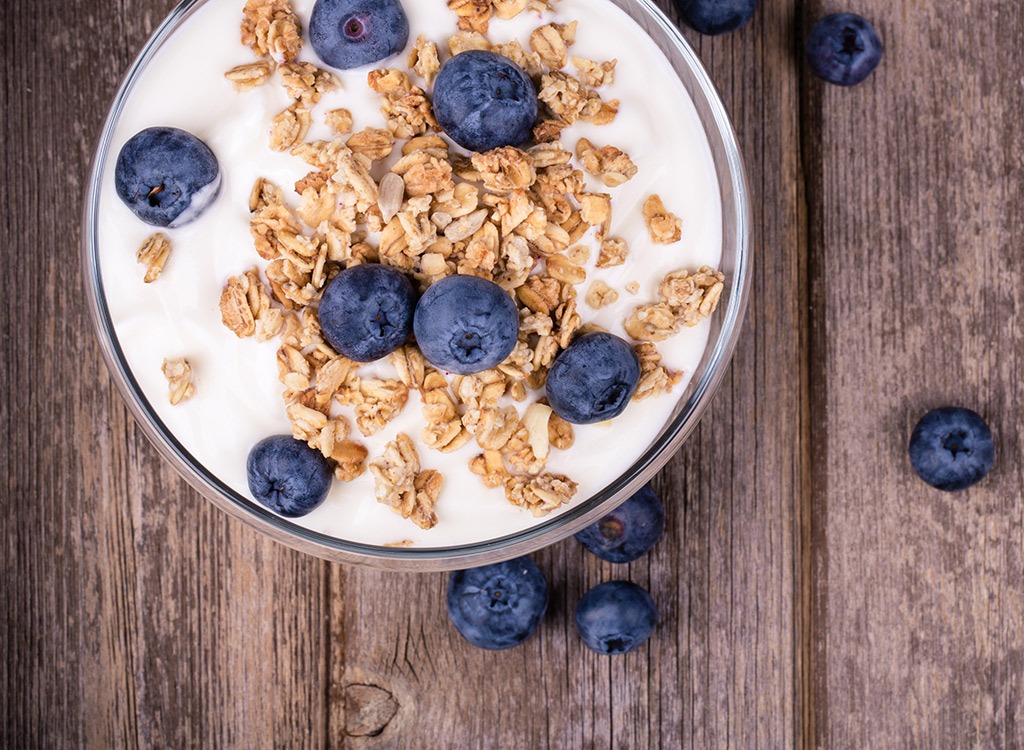
Probiotics in products like yogurt and fermented foods like pickles and sauerkraut help good bacteria in the gut process food more efficiently. Not only is yogurt a great source of protein and calcium, a Nature study found that eating it as part of a reduced-calorie diet can help shrink your waistline. And you can incorporate it into dishes throughout the day.
Brew a caffeinated cup of coffee

Coffee is one of the best drinks for weight loss because it boosts your metabolism. A study published in the journal Food Science and Biotechnology found that caffeine revs the sympathetic nervous system and increases lipolysis (aka fat burn). A cup of black coffee is a good pre-workout beverage, too: Researchers found that cyclists who took a caffeine supplement were able to ride about a mile farther than those who took a placebo. Make yours a venti and skip the sweeteners.
But don't overdo it on the caffeine

Have a few cups of java for a metabolism boost, but if you're never seen without a mug at your lips, that could work against you, says Shapiro. Caffeine is a natural appetite suppressant. If you're constantly consuming it, you may not eat much—or realize how hungry you really are—until you get home for dinner. "Not eating enough throughout the day can make your metabolism sluggish," she says. "By the time you eat dinner, instead of immediately using that food for energy, your body is aggressively storing it as fat, just in case it will be deprived again." Stick to three to four cups of coffee a day to keep your caffeine intake under control.
Add more avocado
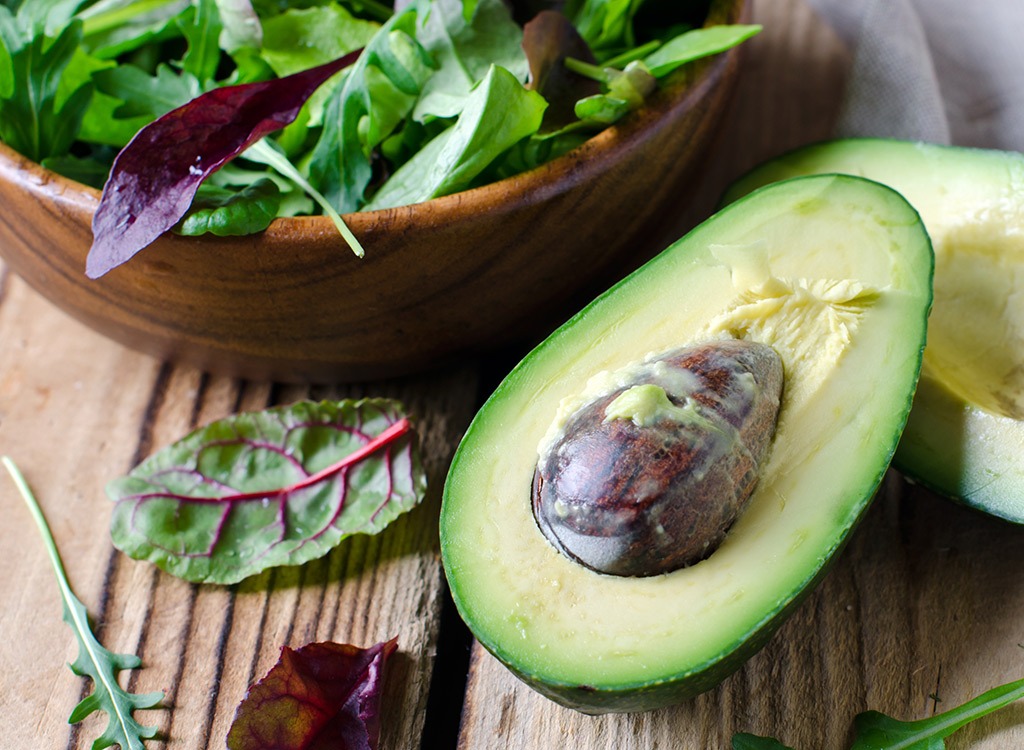
It's like butter that grows on trees. But instead of the cholesterol, trans fats, and saturated fats in real butter, avocado contains metabolism-enhancing monounsaturated fat. And that's not all. Each creamy fruit is also packed with fiber and free-radical-killing antioxidants. Free radicals are destructive rogue oxygen molecules—natural byproducts of metabolism—that trigger various chain reactions in the body that destroy cells and DNA, causing all kinds of health problems. Antioxidants in fresh fruits and vegetables can help neutralize some free radicals, but they can't reach the mitochondria—the base camp for the free radical army—and that's a problem.
When your mitochondria aren't working properly, your metabolism runs less efficiently. Enter: Avocado. A 2015 study found that monounsaturated-rich oil pressed from the fruit can help mitochondria become more resilient. Researchers say the results jive with low-disease rates in Mediterranean countries where olive oil—nutritionally similar to the avocado—is a diet staple.
Always opt for organic beef, eggs, and dairy
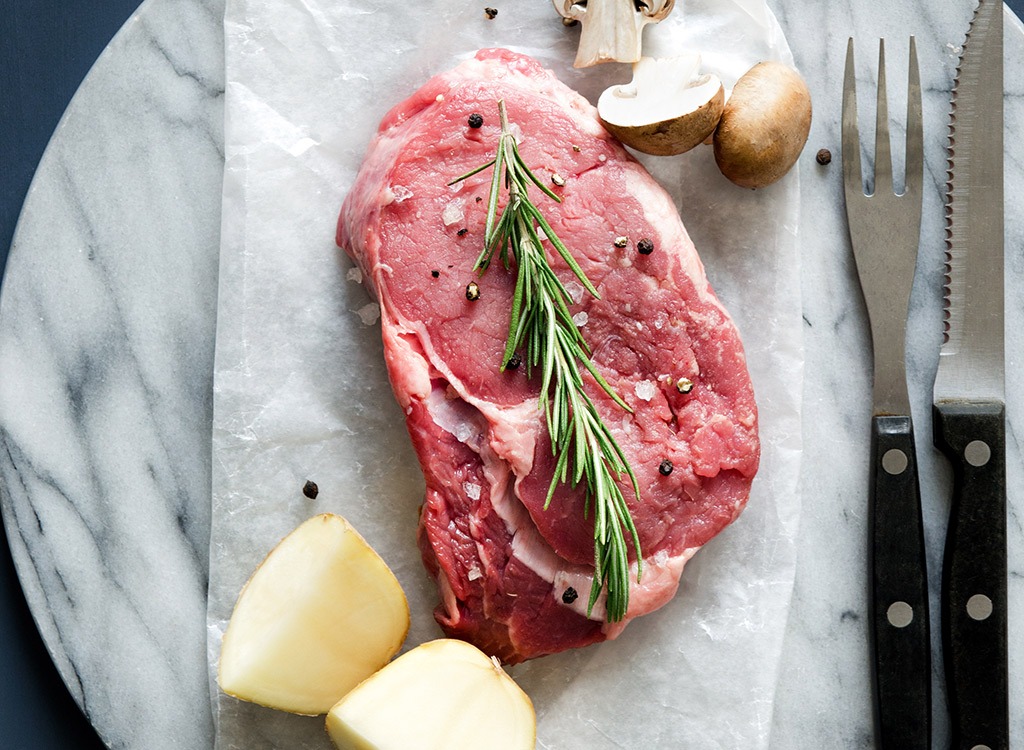
"Hormones dictate how our body utilizes the energy we give it," says nutritionist Lisa Jubilee. "Between our reproductive, thyroid and growth hormones, appetite, insulin, and hunger hormone leptin and ghrelin, our bodies have to perform a tricky balancing act to keep us lean, energized and viable reproductive beings." Those tasks have become much more difficult because of the hormone residues we consume via cage-raised foods. If you want to give your metabolism a leg up, Jubilee says, switch to organic, grass-fed, pasture-raised beef, eggs, and dairy products, thereby avoiding those nasty hormones at mealtime.
Choose broccoli
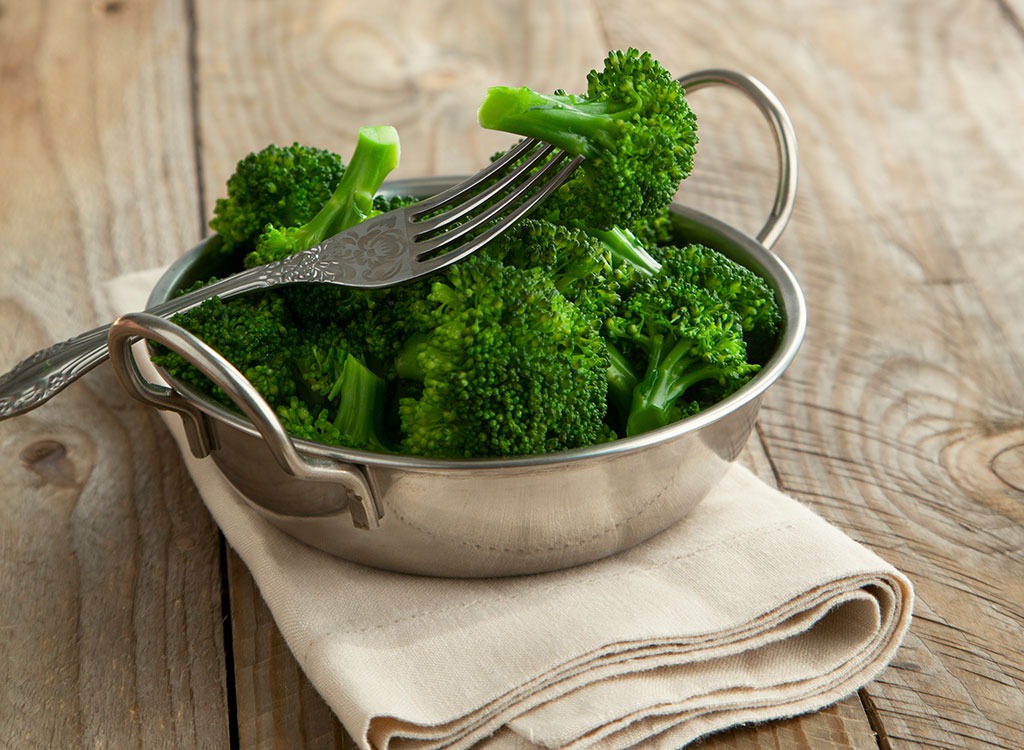
Calcium and vitamin C team up well to boost metabolism. Broccoli contains both nutrients, not to mention the kind of fiber that's been shown to increase TEF. What's more: Broccoli contains a compound that works on a genetic level to effectively "switch off" cancer genes, leading to the targeted death of cancer cells and slowing of disease progression.
Laugh more

It's no joke: Genuine laughter may cause a 10–20 percent increase in basal energy expenditure and resting heart-rate, according to a study published in the International Journal of Obesity. That means a 10-15 minute giggle fest could burn up 40 to 170 calories. Let us hear you lol!
Add mustard to meals

Add mustard to your meal, and feel the burn—literally! Scientists at England's Oxford Polytechnic Institute found that by eating just one teaspoon of mustard (about 5 calories) can boost the metabolism by up to 25 percent for several hours after eating. The benefits, researchers say, may be attributed to capsaicin and allyl isothiocyanates, phytochemicals that give the mustard its characteristic flavor.
Move for two minutes

Forget slogging on the treadmill for hours, research printed in the journal Physiological Reports showed that people who did five 30-second bursts of max-effort cycling, followed by 4 minutes of rest, burned 200 extra calories that day. That's just 2.5 minutes of work for a resting metabolism boost that will last 24 to 48 hours!
Pick spicy peppers
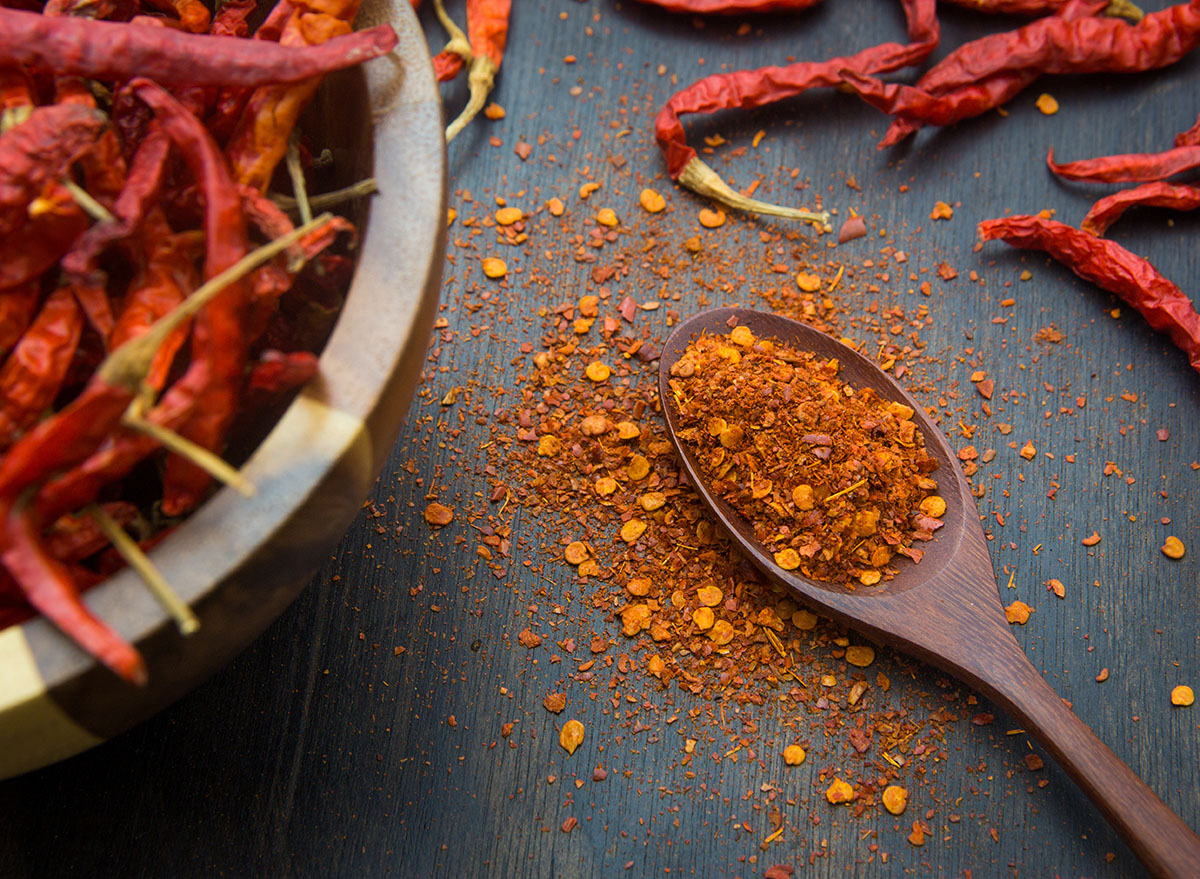
It's well reported that fiery capsaicin (think: hot sauce, cayenne, chili) can rev up the metabolism, but study findings presented at the Experimental Biology meeting in Anaheim, California, showed similar weight loss potential in dihydrocapsiate (DCT), the non-spicy cousin of hot peppers. Participants who ate the most DCT experienced a metabolic boost that was nearly double the placebo group! Bottom line: Pile on the poblanos!
Lower your bedroom temperature at night

A striking new study published in the journal Diabetes suggests that simply turning on the AC may subtly transform a person's stores of brown fat, the "good" fat stimulated by cold temperatures, that serves to keep us warm by burning through "bad" fat stores. Participants spent a few weeks sleeping in bedrooms with varying temperatures: a neutral 75 degrees, a cool 66 degrees, and a balmy 81 degrees. After four weeks of sleeping at 66 degrees, the men had almost doubled their volumes of brown fat. Cool!
Eat the bulk of your carbs at night
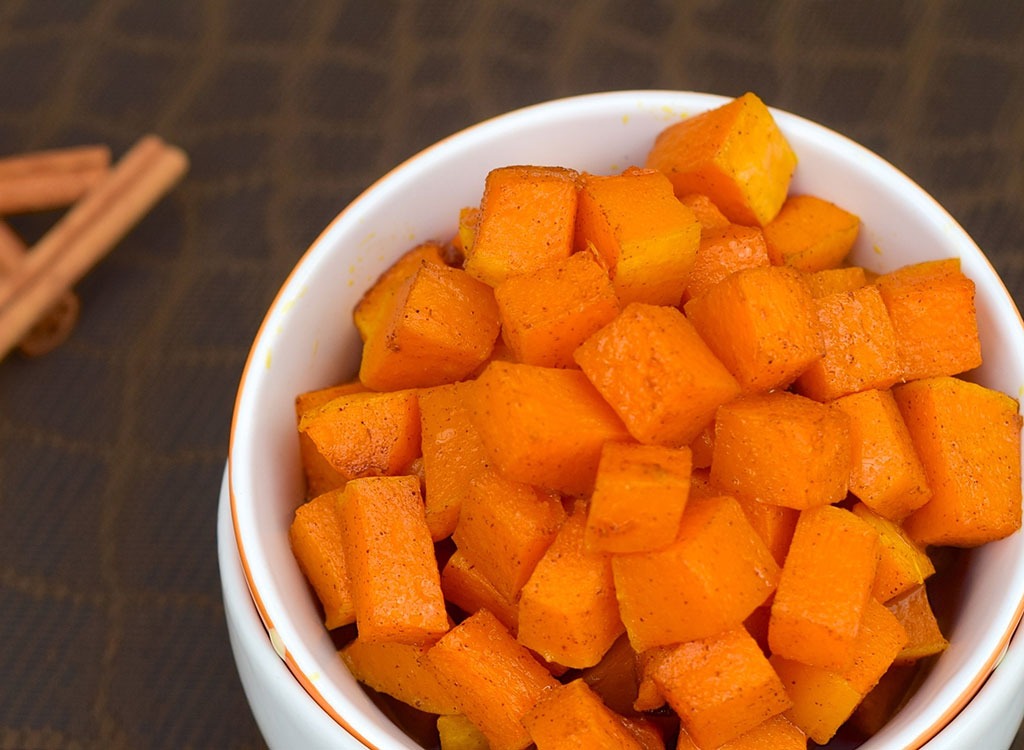
One study in the European Journal of Nutrition put two groups of men on identical weight loss diets. The only difference? Half of the group ate their carbs throughout the day while the second group reserved carbohydrates for nighttime. The result? The nighttime carb group showed a significantly higher diet-induced thermogenesis (meaning they burned more calories digesting their food the next day). On the other hand, the daytime-carb group showed increased blood sugar levels. Experts believe that when you give yourself large gaps between your carb intake (like fasting overnight), your body is more equipped to deal with your intake of blood-sugar-raising carbs when you have them next.
Add vinegar to meals

Not only is vinegar great on salad, it's also shown to "switch on" genes that release proteins that break down fat. In a study of 175 overweight Japanese men and women published in Bioscience, Biotechnology, and Biochemistry, researchers found that participants who drank one or two tablespoons of apple cider vinegar daily for 12 weeks significantly lowered their body weight, BMI, visceral fat, and waist circumference.
Have an egg yolk—or two
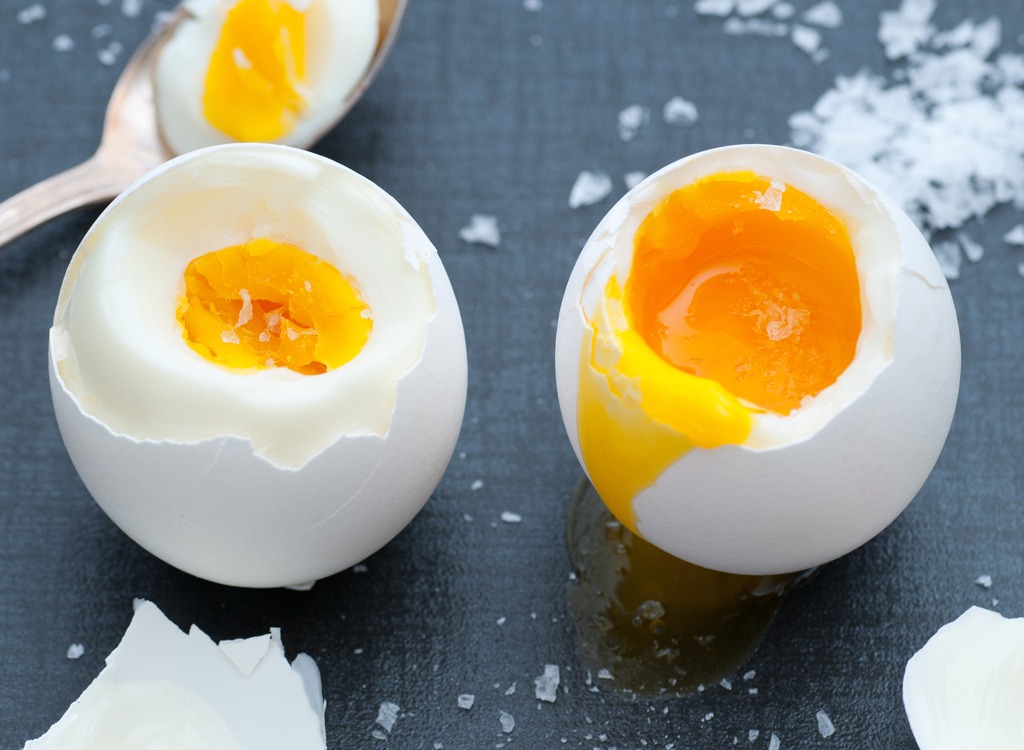
Although it's true that egg whites are low in calories, fat-free, and contain most of the protein found in an egg, eating the entire egg is beneficial to your metabolism. The yolk contains many metabolism-stoking nutrients, including fat-soluble vitamins, essential fatty acids and—most significantly—choline, a powerful compound that animal research shows can prevent the storage of fat around your liver. Worried about cholesterol? New studies have found that moderate consumption of one to three whole eggs per day has no negative effect on 70 percent of the population's lipid (fat) profile and may actually improve it.
Use extra virgin olive oil

Our bodies need dietary fat—particularly healthy oils—in order to lose weight and function properly. The right kinds of fats and oils help quash hunger, maximize your metabolism, and speed nutrients through your body by helping to absorb fat-soluble nutrients. Diets high in healthy monounsaturated fats, like olive oil, can actually help the body to burn calories and lose weight compared to low-fat diets.
Additionally, studies show extra virgin olive oil may also increase blood levels of serotonin, a hormone associated with satiety.
Sip on green tea

If you always opt for coffee over tea, you could be missing out on a major metabolism boost. A Penn State animal study found supplementing exercise with green tea can actually boost weight loss. In fact, after 16 weeks, rats experienced a body mass reduction of 27.1 percent and an average abdominal fat mass reduction of 36.6 percent. What's green tea's magic? The brew contains catechins, a type of antioxidant that triggers the release of fat from fat cells and helps speed the liver's capacity for turning fat into energy.
Drink full-fat milk
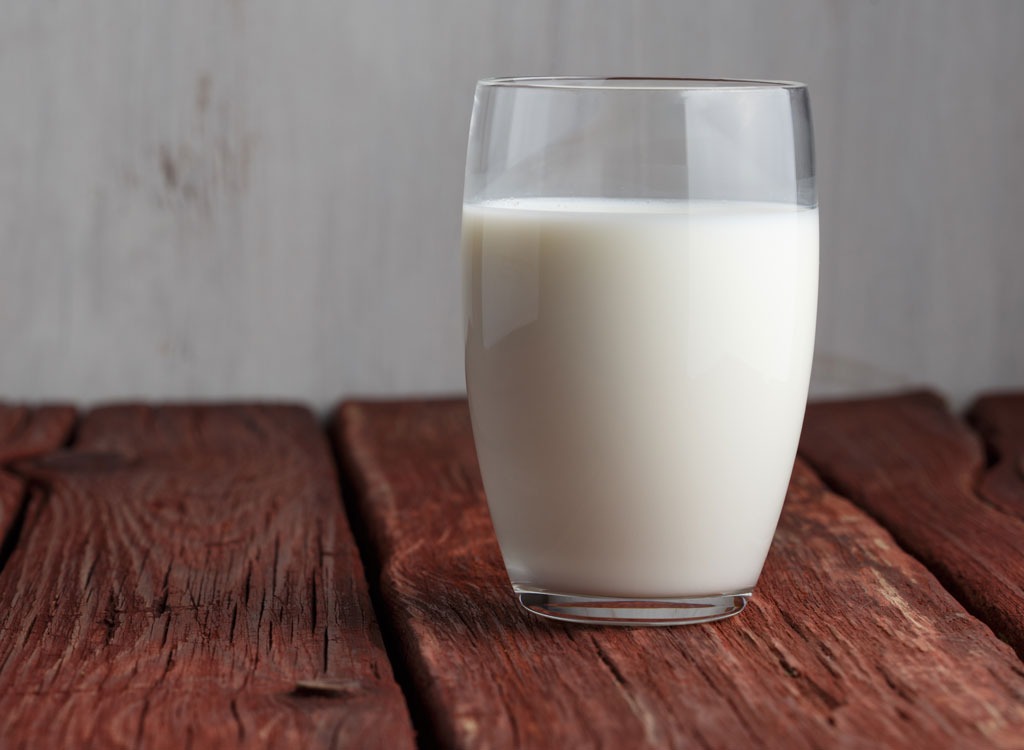
Studies conducted at The Nutrition Institute at the University of Tennessee suggest that consuming dairy may help your body metabolize fat more efficiently. Other studies have shown that increased calcium intake from dairy products (though not from supplemental calcium carbonate) caused study participants to poop out more fat as opposed to it sticking around on the body.
Stand at work three hours a day

Ideally, we sleep about eight hours for every 24. Most people spend another seven to ten hours sitting at their desk. That means most of us spend the overwhelming majority of our time sedentary. Our bodies weren't designed for this level of inactivity—most of humans' evolutionary history involved being active, searching for food and fuel. Nutritionist Lisa Jubilee says that one way to burn more calories daily is to stand more and sit less. She cites a British study which found that standing at work burned 50 more calories per hour than sitting. If that doesn't sound like a lot, consider this: If you stand for just three hours of your day, in one year you'd expend more than 30,000 extra calories—which amounts to about 8 pounds of fat!
Eat more garlic
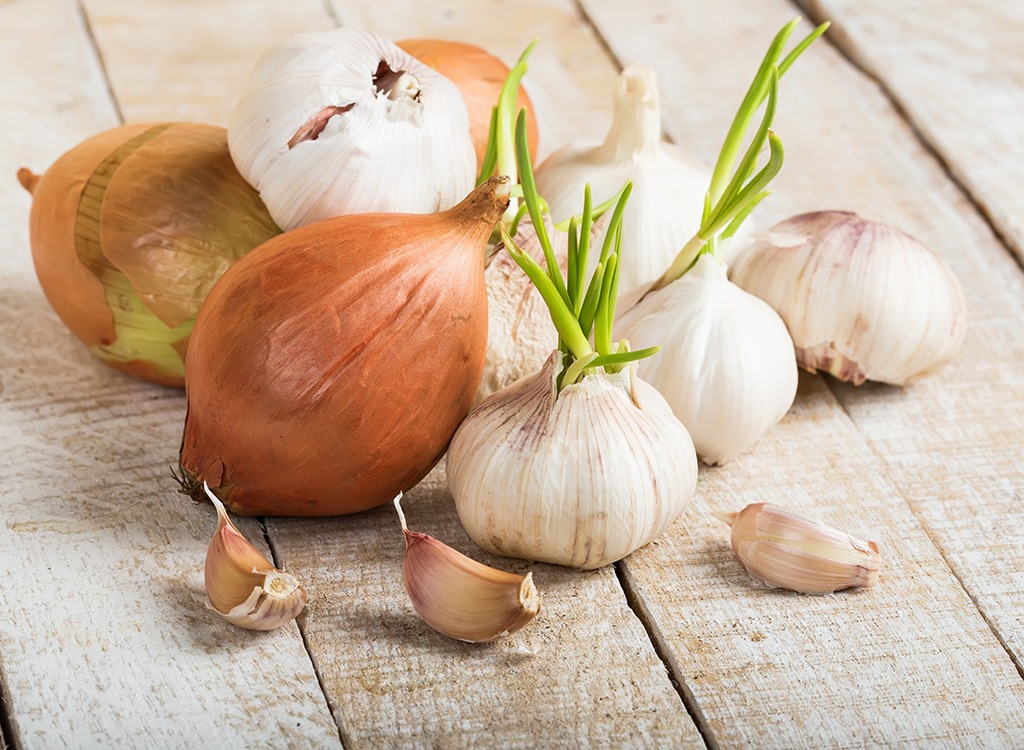
Recent studies have shown that garlic supports blood-sugar metabolism and helps control lipid levels in the blood. Adding garlic to foods that are rich in fats and carbohydrates may keep those substances from doing the damage they're known to do. What's more, eating garlic can help boost your immune system, help ward off heart disease, fight inflammation and lower blood pressure, to name a few.
Nibble on dark chocolate
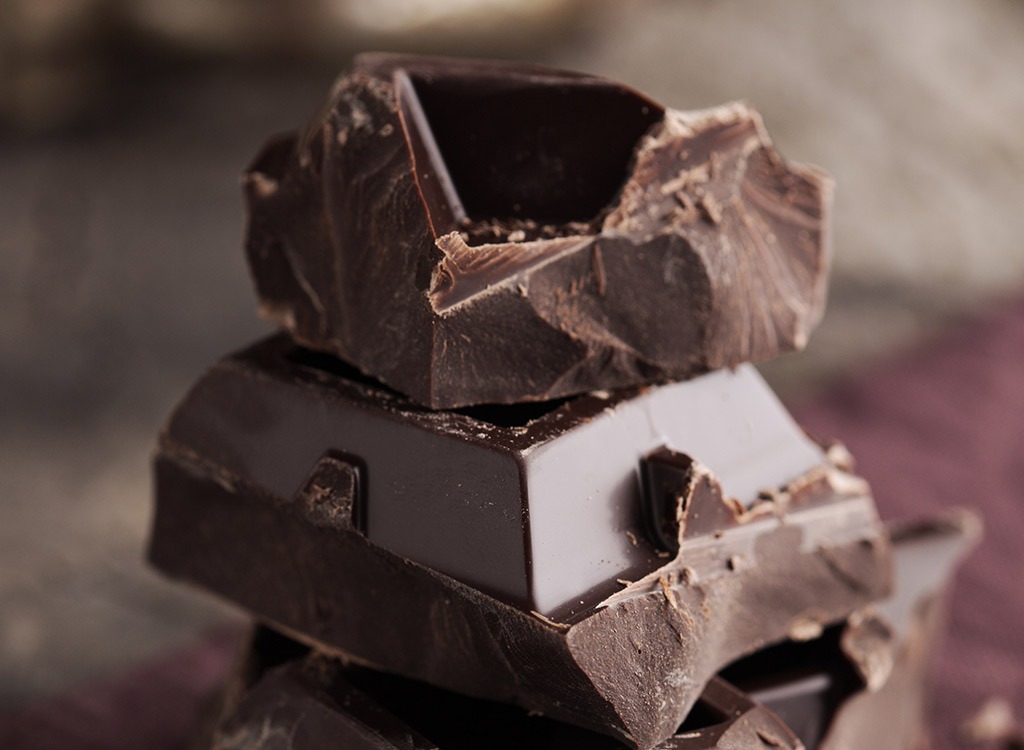
In a study conducted by Swiss and German researchers, lucky participants ate about 1.5 ounces of dark chocolate daily for two weeks. Ultimately, these chocolate nibblers had lower stress-hormone levels and a more regulated metabolism than a control group. Scientists speculate that chemicals in cocoa, such as flavonoids, play a role in regulating metabolism by alleviating stress that can cause your fat-burning engines to go on the fritz. Should you think this is a license to go wild, take heed: We're talking small amounts of high-quality dark chocolate. Researchers say 1.5 ounces is enough.
Turn off sleep-blocking blue light at night

Want to have a faster metabolism? Install apps like f.lux or Twilight on your devices. They reduce certain parts of the light spectrum as your bedtime approaches. Studies have shown that LED lights in phones disturb the production of the sleep hormone melanin. A purring metabolism is greatly helped by a good night's sleep. So take your late-night texting down a notch or two… At least in terms of screen brightness.
Have some cheese
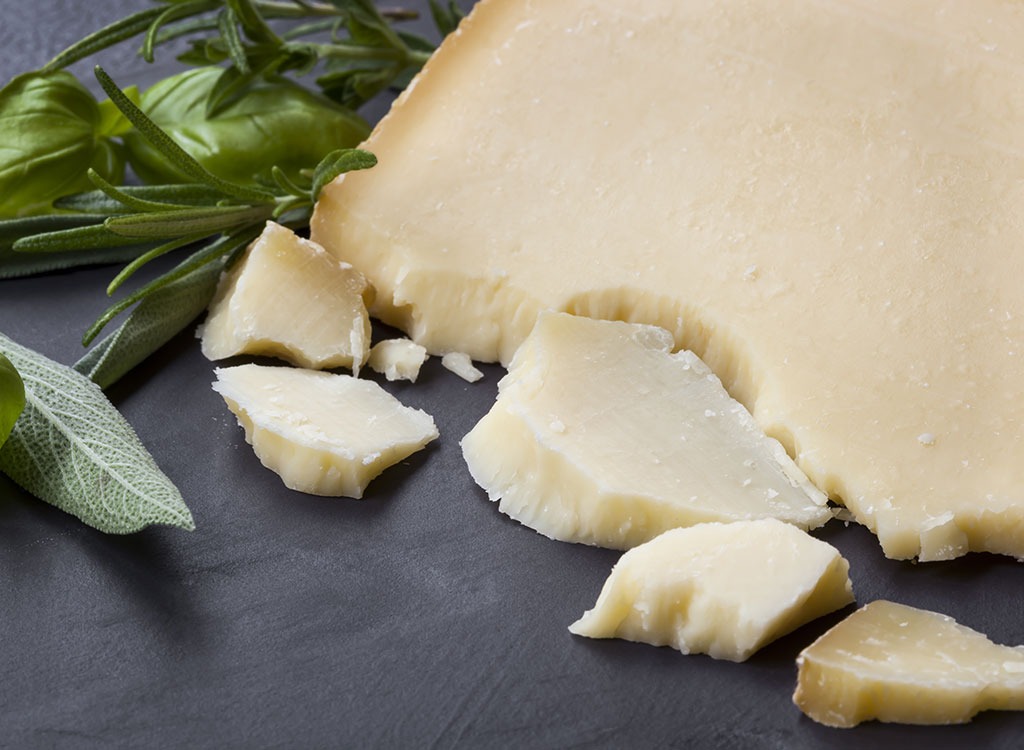
You might want to think twice before ditching dairy if you're trying to lose weight—despite what your Paleo-preaching CrossFit friends tell you. Cheese is a satisfying, portable, and inexpensive food that's packed with calcium, vitamin D, and protein. "Calcium can also promote weight loss because it helps maintain muscle mass, which boosts and helps maintain metabolism, helping you burn calories more efficiently throughout the day," says Tanya Zuckerbrot, RD, author of The Miracle Carb Diet: Make Calories & Fat Disappear—With Fiber! That doesn't mean you can help yourself to a cheese-drenched casserole, though. Work cheese into fiber-rich snacks to make them more satiating.
Give up sugary energy drinks
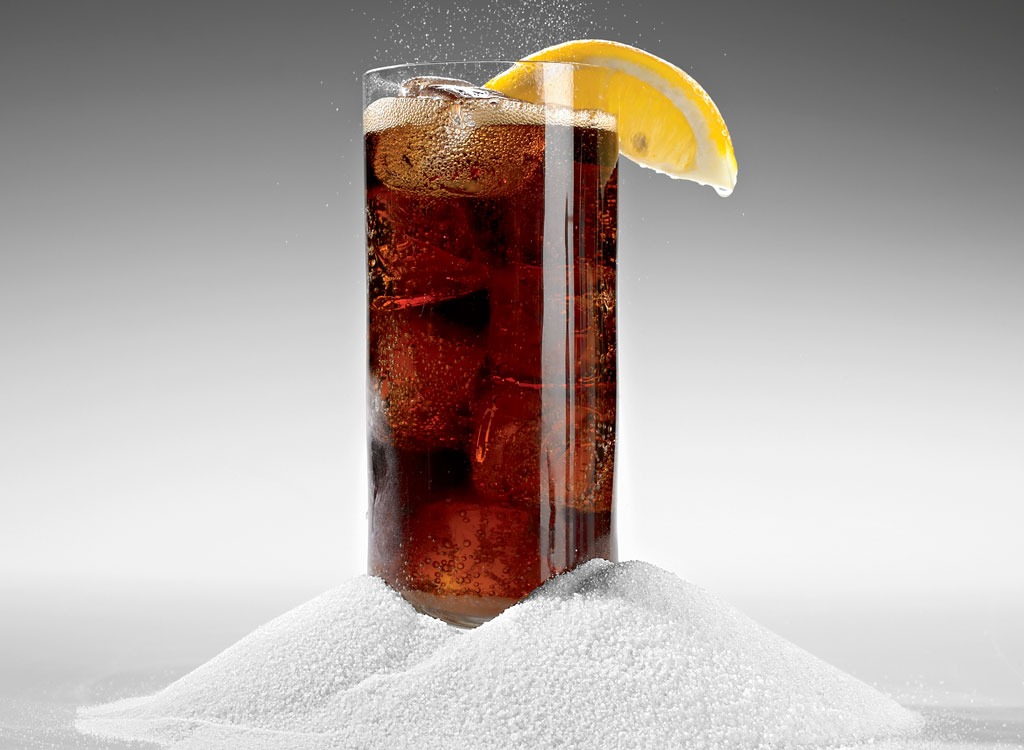
Caffeine may provide a bit of a boost to the metabolism, especially when ingested before exercise, but no amount of metabolic boost can burn off the empty calories that energy drinks supply. According to one study published in Mayo Clinic Proceedings, a typical energy drink serves up a quarter cup of sugar—calories that hit your body all at once and trigger fat storage. If you want to burn calories, try the miracle beverage known as tap water.
Eat full-fat foods
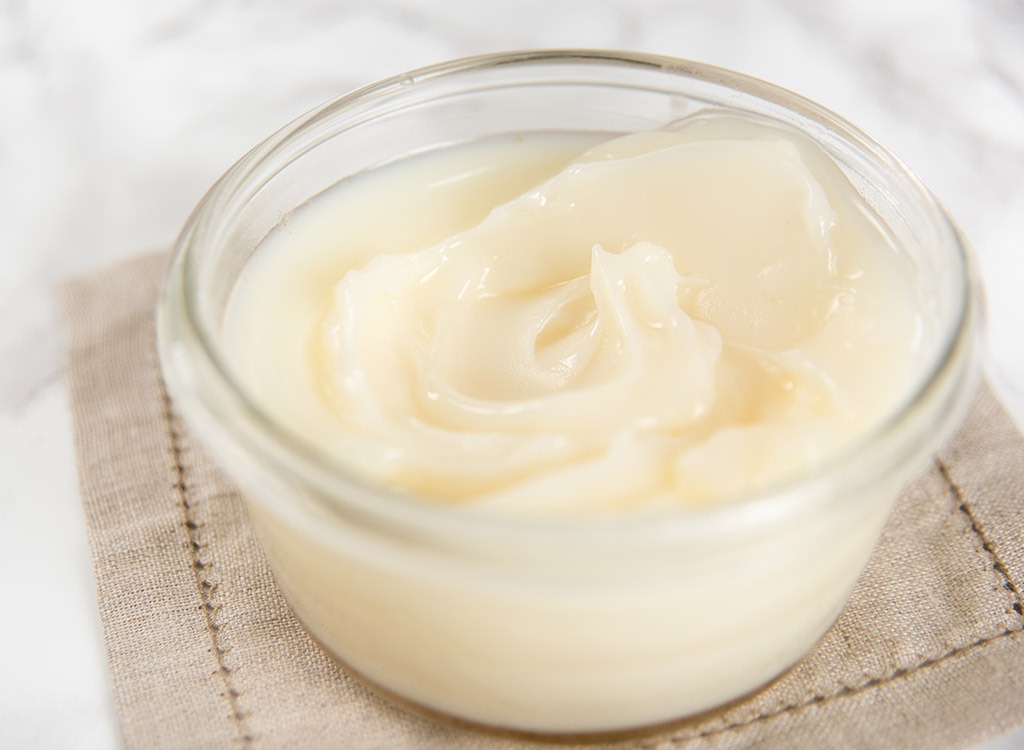
A new report from the Credit Suisse Research Institute found that more and more of us are choosing whole-fat foods over skim, lite, fat-free or other modern monikers of leanness. And while many health organizations like the American Heart Association still want us to cut down on fat—particularly saturated fat—this full-fat trend may be a healthy rebellion against those decades-old credos, according to recent studies. In fact, people who eat a lot of high-fat dairy products actually have the lowest incidence of diabetes, according to a 2015 study of 26,930 people in the American Journal of Clinical Nutrition. Those who ate a lot of low-fat dairy products, on the other hand, had the highest incidence. The researchers speculated that while calcium, protein, vitamin D, and other nutrients in yogurt are indeed good for us, we need the fat that goes along with them in order to reap their protective effects.
Eat an apple a day
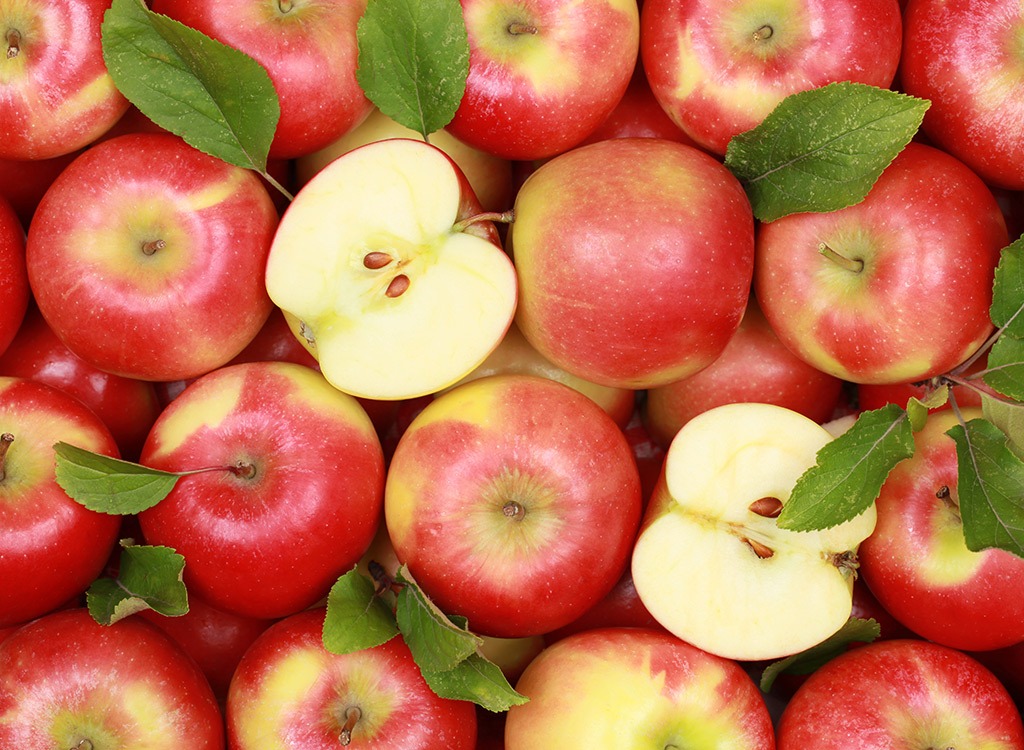
Eating an apple each day can help prevent metabolic syndrome, a disorder associated with abdominal fat, cardiovascular disease, and diabetes. They'll keep the doctor away and your muffin tops at bay because apples are a low-calorie, nutrient dense source of fiber, which studies have proven to be integral to reducing visceral fat. A recent study at Wake Forest Baptist Medical Center found that for every 10-gram increase in soluble fiber eaten per day, visceral fat was reduced by 3.7 percent over five years!
Focus on fiber
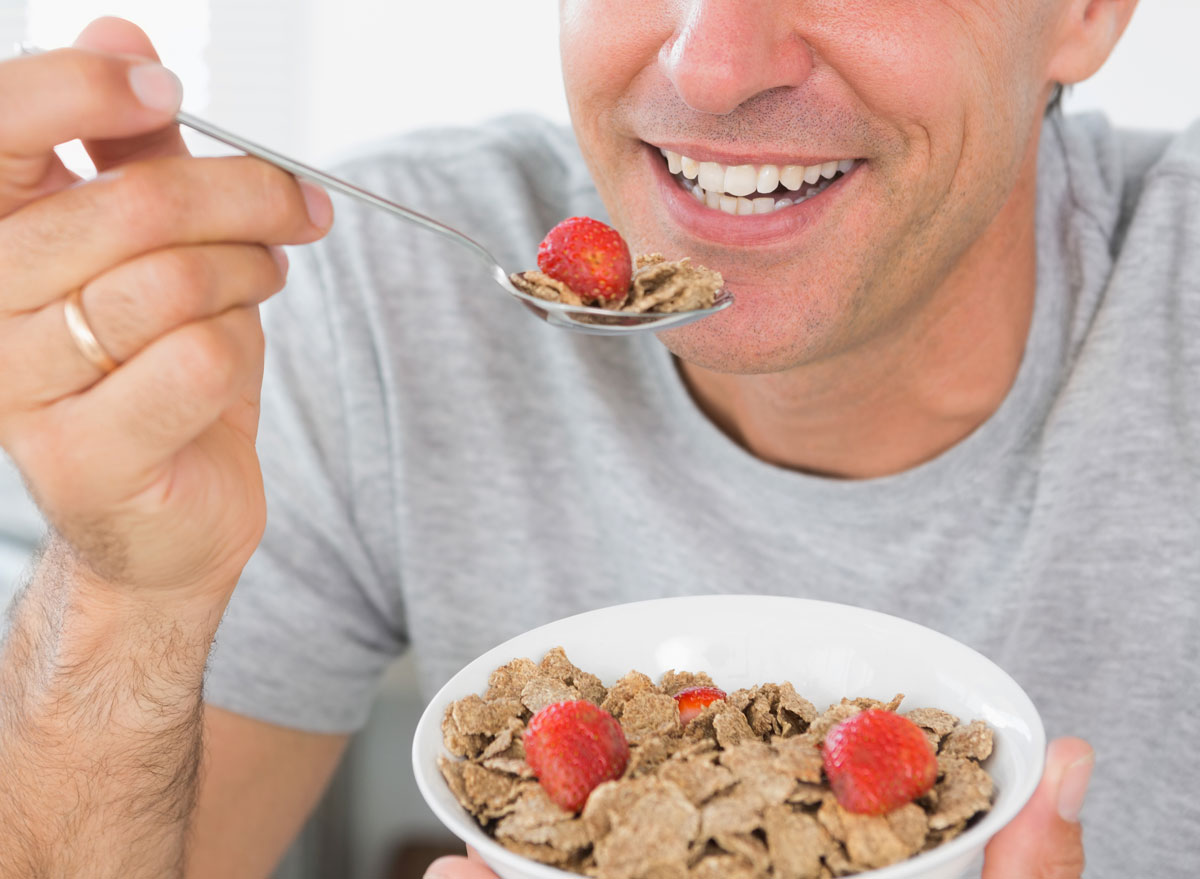
Studies show that those who eat the most fiber gain the least weight over time and that eating fiber can decrease your risk of belly fat by 3.7 percent. Aim for about 28 grams of fiber a day—the amount present in about three servings each of fruits and vegetables.
Plan a weekly cheat meal
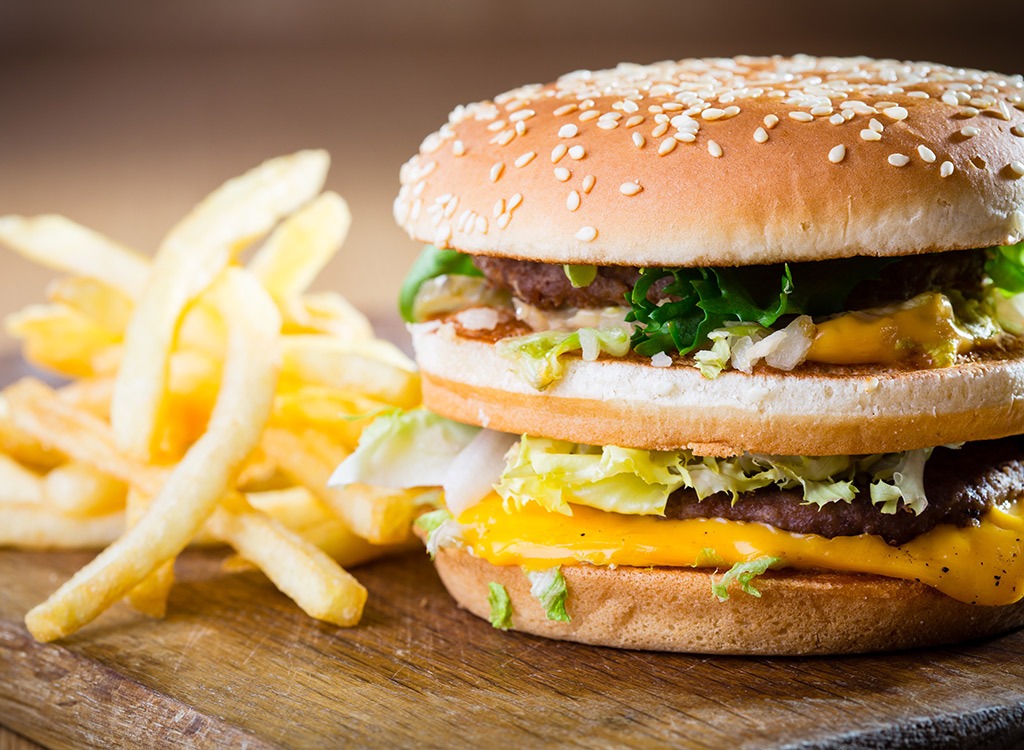
Experts agree that including a weekly cheat meal into your healthy-eating plan can actually help you reach your weight loss goals. Plus, a recent study published in the International Journal of Obesity, discovered that dieters who took a two-week break from their low-calorie meal plan lost more weight than those who dieted consistently.
Having a strategy is key: "By planning your cheat meal, you know what you'll be eating and can cut a few extra calories earlier in the day," says Jim White, RD, ACSM Health Fitness Specialist and owner of Jim White Fitness & Nutrition Studios. "This also allows you to really pick a favorite food instead of wasting calories on something you didn't enjoy."
Have a high-protein breakfast
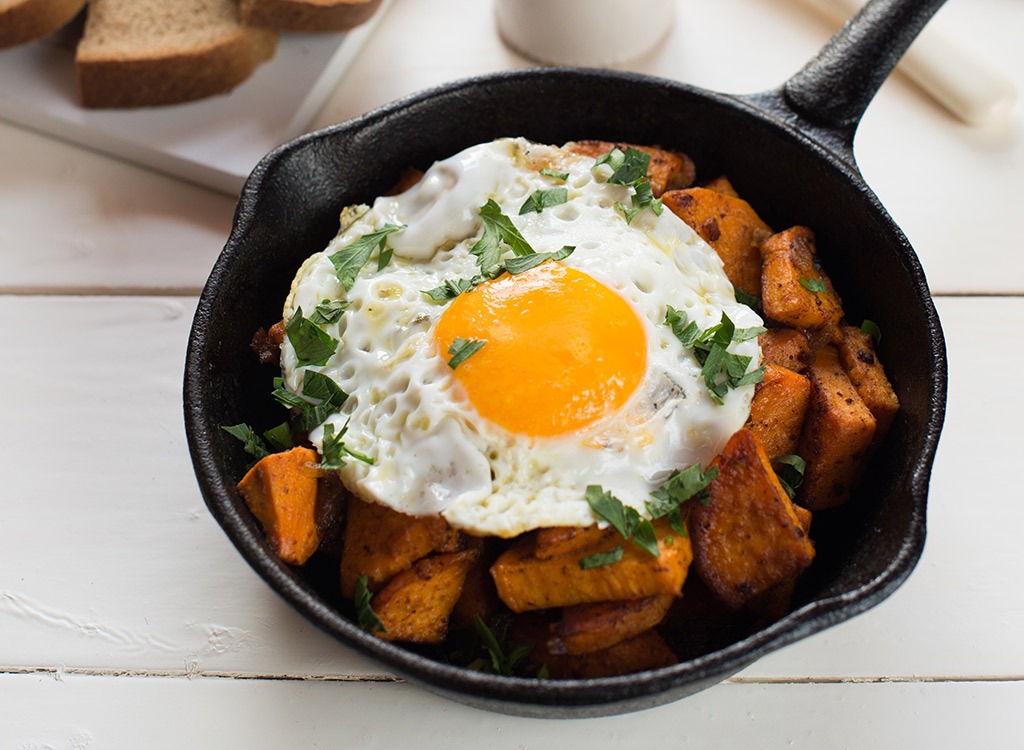
Contrary to popular belief, researchers now say breakfast doesn't kickstart the metabolism and may not be the most important meal of the day. A study in the American Journal of Clinical Nutrition had more than 300 overweight participants consume diets that included either eating or skipping breakfast. At the end of 16 weeks, dieters who ate breakfast lost no more weight than the breakfast skippers. And a second study in the same journal found eating breakfast had zero impact on resting metabolism. Breakfast is an ideal place to squeeze protein, fiber, and other nutrients into your day, but if the choice is a doughnut or nothing, opt for the nothing. Start your day with lean protein, which burns twice as many calories during digestion as fat or carbs. But don't stress about squeezing it in before 9 a.m.
Drink Oolong Tea

This antioxidant-rich, traditional Chinese tea not only helps keep cholesterol levels in check and aids digestion, it can also help rev up your metabolism. Like green tea, oolong is packed with catechins, which boost weight loss efforts by improving the body's ability to metabolize fat. A study in the Chinese Journal of Integrative Medicine found that participants who regularly sipped oolong tea lost six pounds over the course of six weeks.
